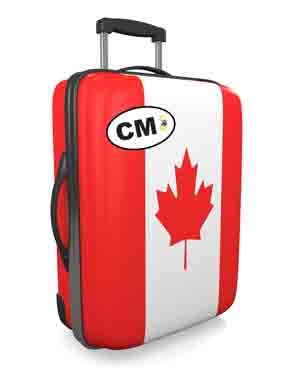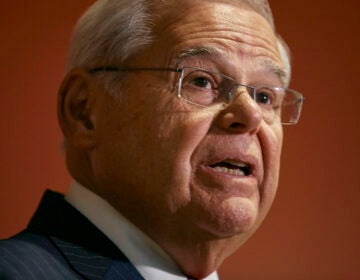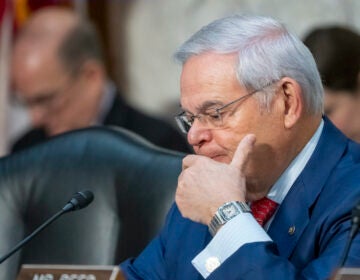Weak Canadian dollar could mean fewer visitors to New Jersey in 2017

Crowded boardwalk in Wildwood, New Jersey. (Bill Barlow/for NewsWorks)
 Every summer, well packed cars and vans with Quebec license plates, emblazoned with the provincial motto “Je me souviens,” return to the Jersey shore, where thousands of Quebecoise have vacationed for decades.
Every summer, well packed cars and vans with Quebec license plates, emblazoned with the provincial motto “Je me souviens,” return to the Jersey shore, where thousands of Quebecoise have vacationed for decades.
Literally “I remember” in English, the motto is usually seen as an expression of self-determination for French speaking Canadians, and a reminder of the long and sometimes rocky history of the country’s most populous province, which remains linguistically and culturally distinct from the rest of the nation.
Diane Wieland, Cape May County’s tourism director, described the French speaking Canadian visitors as a faithful group, returning year after year to their favorite spots for what is typically a two-week vacation.
It’s about a 10 and a half hours to drive from Quebec City to Wildwood, and one that thousands of families take each year. A county report in 2015 indicated Canadians make up 11 percent of the summer visitors the county’s economy counts on, compared to 27 percent from the far closer Pennsylvania and 28 percent from in-state. New Yorkers make up 19 percent, with a smaller number from the Washington, D.C. area and other states. Wieland described the group as an important part of a successful summer for many businesses.
But no matter how faithful the visitor, Canadians have far more vacation options than ever before, and the current exchange rate between the American and Canadian dollar puts them at a strong disadvantage.
A couple of years ago, the Canadian Loonie — nicknamed for the bird on the tail side of the dollar coin – was trading at well over the American dollar, which may hurt national pride but meant stronger spending from northern visitors. This year, Canadians are looking at 74 cents on the dollar.
“When you lose 24 cents, that hurts,” said Wieland.
Calls for local business to do more
Cape May County is not the first beach you reach when driving south from Quebec, but it’s one of the first with soft sand where the water is usually warm enough to swim in July. Canadian families have been making that long drive since at least the 1960s, many staying in the numerous campgrounds in mainland Cape May County a short drive from the barrier island beaches, especially in Wildwood.
Back in 1968, Cape May County realized there was a growing number of visitors from Quebec, and decided to focus on that market. In 1970, the county opened a full-time tourism office in downtown Montreal, one it operated for 25 years.
According to Wieland, who started working with the county in 1975, after Canada instituted a goods and service tax that was going to hit the county operation hard, the county decided to instead hire a Canadian public relations specialist to represent Cape May County in Quebec full time. Nicolle Dufour is paid $22,000 a year to work year-round on Cape May County’s behalf, Wieland said.
To do this, Dufour said in a recent telephone interview, she tries to present something new about the county each year. Not surprisingly, it started with the beaches and ocean, but then she pushed the county as an ecotourism destination, saying many French Canadians love the outdoors. Next, it was the food.
“We try every year to change the subject,” she said, echoing Wieland in describing her fellow French speaking Canadians. “Quebec people are very faithful and come back year after year.”
But there is a limit.
It can cost big money to bring a family to the Jersey Shore for two weeks, even at a campground.
An unfavorable exchange rate adds insult to injury, Dufour said. Meanwhile, a flight to the Dominican Republic or even Florida may be a cheaper option.
“It’s hard. Last September, we went to Cuba. The airfare, hotel, three meals and alcohol were all included, $1200 for two weeks. Can you imagine?” she said. “You don’t have to bring money except for the tip.”
The best way to counter this, as Dufour sees it, is for Jersey Cape businesses to make an effort to attract Canadians and keep them coming. She suggested specials, discounts and packages aimed at Canadians to try to ease the impact of the exchange rate.
According to Wieland, Canadian visitors have moved beyond the campgrounds, including millennials who may have visited the campgrounds as children and are now starting their own families, and baby boomers who feel ready for a little more luxury. When the exchange rate was closer to even, she said, the county saw an expansion of the French speaking visitors, impacting each of the resort towns in the county.
Dufour said she has helped things along by arranging travel writers and television teams to visit the county. One resulted in a huge, favorable spread in the travel section of La Presse, a large circulation daily in Montreal, she said. There have also been coverage in the CAA magazine, the Canadian version of AAA, and that a crew from a beach-focused television show is set to film in the county. She’s also led tours for French speaking travel writers.
But she complained that it is difficult to get local businesses to offer free accommodations, which she described as necessary to get travel writers to come.
Trump effect?
Neither Wieland nor Dufour wanted to say much about the potential impact on the Canadian visitors of President Trump’s election and the change in the American cultural landscape that came with him. Wieland said she had heard from some Realtors that some Canadians decided not to come, citing Trump’s immigration policies, but she had not heard that directly.
Dufour said the president is deeply, sweepingly unpopular in Quebec, but said she did not want to talk politics.
“Even if I don’t like Trump, if I want to go to the ocean, then what is my choice?” she said, adding that dipping a toe in the Saint Lawrence River may mean your toes turn blue. “I think it’s a bad reason to spoil your vacation.
“If you hate him or love him, you’re there two weeks. What difference does it make who the heck is president?”
A story in La Presse, posted in March, cited Trump as a reason some Canadians are cancelling plans to visit the United States. But the story by Thomas Urbain indicates that the exchange rate plays a bigger part, and that most experts believe the slowdown will be brief.
There may be other factors at play. A recent NPR report indicates that agents with the Border Patrol have gotten more aggressive in the questioning of Canadian nationals heading into the United States. This for years has been one of the easiest border crossings in the world. Some quoted in a piece by Joel Rose say concerns are overblown, but he also cites cancelled trips, including a planned visit by a troop of Girl Guides, a Canadian group similar to the Girl Scouts.
But for Dufour, it all comes down to dollars.
“It’s really the money exchange,” she said. That and the need to convince hotels and motels to make more effort to welcome Canadians.
WHYY is your source for fact-based, in-depth journalism and information. As a nonprofit organization, we rely on financial support from readers like you. Please give today.




